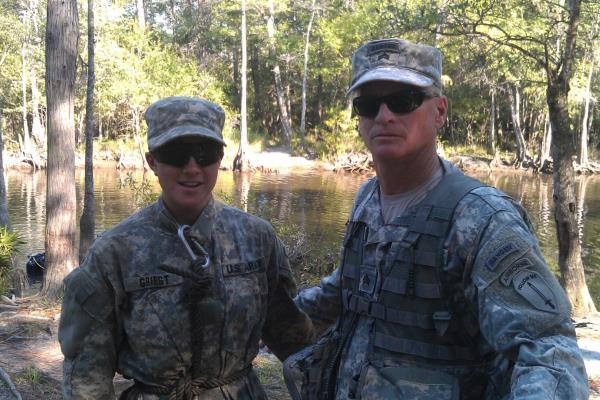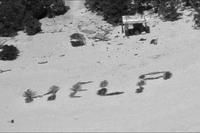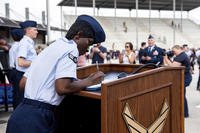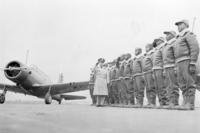Several years ago, Timothy Spayd and his family were alarmed to notice he was suddenly losing weight.
The weight loss -- two dozen pounds in little more than a month -- was accompanied by severe back pain. After visiting multiple doctors and undergoing a battery of tests, the former U.S. Army sergeant received grim news.
He had amyotrophic lateral sclerosis, or ALS, a progressive neurodegenerative disease also known as Lou Gehrig's disease. The condition attacks nerve cells in the brain and the spinal cord, eventually affecting a person's ability to speak, eat, move and breathe. The average life expectancy of someone with the disease is two to five years from diagnosis.
"You go through it all," the 54-year-old said, referring to his emotions after he was diagnosed. "You go through the, 'Why me?' You go through super depression. You contemplate suicide. Everything goes through your brain. I think that's a normal reaction to something that's so traumatic and terminal."
In 2013, his wife Karen was diagnosed with lung cancer and Spayd sank further into despair. He was most upset at how their daughter, Sarah, now 13, would cope with the changes.
BACK TO SCHOOL
Sensing Spayd could use an emotional boost, a longtime friend of his and fellow ex-Ranger contacted Army officials at Ranger School to see if Spayd could spend a day soldiering with the premiere infantry training program -- similar to what the Make-A-Wish Foundation does for children with life-threatening medical conditions.
The Army was receptive to the idea and Spayd found himself wading into the Florida swamps with soldiers half his age. He recalls the temperature was particularly cold that first night, in the upper 20 degrees -- so cold that a scheduled boat exercise was canceled. "It impressed the guys that I hung in there in those conditions," he said. "They thought I was pretty hard core -- old school. I guess I earned their respect then."
But the 1980 graduate of Ranger School didn't stop there. Spayd kept going back to volunteer with the course on a part-time basis. He even got a chance to spend some time with Capt. Kristen Griest, one of the first two women in history to complete the course. This month, he participated with his 21st consecutive class.
"You have to find some happiness somewhere," he said. "It's like your joy was taken. I just always loved being a Ranger."
To be sure, Spayd only joins the group for about three days out of the two-month-long program, which is a grueling affair designed to push soldiers to their mental and physical limits. But he deliberately returns for some of the most difficult days, including waterboard operations, to inspire the soldiers and "motivate them and toughen them up."
DEGENERATIVE DISEASE
ALS affects about 20,000 Americans, mostly between the ages of 40 and 70, according to the ALS Association, a nonprofit based in Washington, D.C. For unknown reasons, military veterans are twice as likely to be diagnosed with the disease than the general public, according to the association.
Spayd said he's lucky that he has a slow-progression type of the disease. His symptoms started in his legs and have since progressed to his upper body, but haven't yet affected the facial muscles or speech.
He said he's hopeful that last year's record-setting "Ice Bucket Challenge" fundraiser for ALS will generate research that leads to a cure for the disease. For now, he's trying to maintain his nutrition, including eating avocados and taking coconut oil.
"I believe in prayer," he said. "Everything gives me hope. Otherwise, you go the other way and you don't want to do that."
MUSIC MAN
After he left the Army, Spayd earned a bachelor's of arts degree from Florida State University. He majored in classical guitar, minored in piano and excelled in music theory. He plays a number of stringed and percussion instruments, from the guitar and mandolin to drums and piano.
In 1985, Spayd auditioned to sing in the choir with the rock band Foreigner for its "I Want to Know What Love Is" tour. In 1992, he also performed a couple of concerts with Jim Nabors, known for playing the character of Gomer Pyle on the 1960s sitcom, "The Andy Griffith Show."
Spayd is benefiting in ways he didn't expect by volunteering at Ranger School. For example, during a recent break there, an Australian soldier there showed him how to play guitar to dropped C tuning. "Here I have all this education on the guitar and I've never heard of drop C tuning, but it has to do with metal," he said, referring to the heavy metal genre.
He and his wife and daughter, who also sing and play instruments, recently performed together at a church service at the school. The service drew some 50 Ranger students, he said. "They're famished and here they were clapping with us to the beat," he said.
CHALLENGES AHEAD
Spayd and his wife face more medical challenges ahead. He will need to undergo surgery to remove a growth and his wife will be returning to her cancer specialist. "That's life, especially with what we're facing," he said. "It's one day at a time."
Spayd said he plans to live at home, unless it becomes too difficult for him or the family. After "some hard talks," he and his wife have talked to her sister and brother-in-law to take in Sarah, if necessary.
For now, Spayd is trying to focus on helping others, such as getting a voice-speaking computer for another Army veteran and "pal" ("person with ALS") who's losing his ability to talk. "His wife has to hear him two or three times before she understands what he's trying to say," he said. "I don't understand why things get bogged down," he added, referring to the VA's delay in getting the equipment.
Spayd said he's not sure how much longer he plans to continue volunteering at Ranger School.
"I was out there the other night going, 'What the heck am I doing out here?'" he said. "Every time it's harder. I guess I am just getting weaker and I don't want to admit it, so I go out there and tough it out. That's the Ranger attitude. Somebody smarter than me might say, 'You don't need to come out here anymore.' I guess I trick them all every time because they keep letting me come back."
--Brendan McGarry can be reached at Brendan.McGarry@military.com. Follow him on Twitter at @Brendan_McGarry.



























